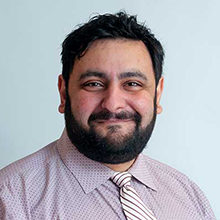The Comprehensive Sickle Cell Disease Treatment Center at Massachusetts General Hospital launched in early 2021 with a vision to create a true medical home for patients living with sickle cell disease. By bringing together experts in a range of disciplines across Mass General, the Center provides a compassionate approach that improves health and quality of life. Under the direction of Sharl Azar, MD, the integrated care team includes experts in internal medicine, hematology, nursing support, social work and many other specialties.
The most common symptom of sickle cell disease (SCD) is debilitating pain. With SCD, red blood cells misshapen in a crescent or sickle form instead of a disc. These sickle cells are prone to getting stuck on vessel walls, creating blockages, called vaso-occlusive events, or VOEs, that slow or stop the flow of blood and oxygen. In addition to preventing the organs, bones and tissues from getting the oxygen they need, VOEs can cause sudden, severe pain that often requires hospitalization.
Prioritizing a Health Disparity
Approximately 98 percent of patients with SCD are Black or African American, and rates of SCD are also higher among Latinx and other ethnicities than among whites. Unlike other chronic diseases, however, very few health care providers offer the kind of comprehensive patient care for SCD that Mass General is pioneering.

The Center also addresses another critical need. As children age out of pediatric SCD care, they often disconnect from treatment and mortality rates at this stage are high. The Center cares for patients of all ages so there is no break in coordinated medical treatment, an approach that should save lives.
An Expert Approach to Pain
Managing pain is a critical part of helping people living with SCD. At the Center, patients can access acupuncture, massage therapy, yoga and meditation as part of their treatment. They also have something that isn’t available to SCD patients almost anywhere else: a palliative care team with expertise in addressing severe pain.
Often associated with terminal illnesses like cancer, palliative care is an approach to treating the whole patient, managing symptoms and side effects to maximize quality of life and attending to the psychological, spiritual and emotional dimensions of living with a chronic condition.
“I foresee palliative care becoming the cornerstone of sickle cell treatment — they have expertise that goes beyond what internal medicine and hematology can offer,” says Dr. Azar.
The Center’s groundbreaking partnership with Mass General Palliative Care is made possible by philanthropic support from Global Blood Therapeutics, a pharmaceutical company that aims to discover, develop and deliver life-changing treatments for people with serious blood-based disorders.
The Dramatic Impact on Patients’ Lives
The team is already seeing results of the Center’s holistic approach to care. “A veteran in his early 40s with a 7-year-old son came to the Center on very high doses of opioids. The side-effects were debilitating, but he couldn’t imagine life without them,” Dr. Azar says. “Working with our care team, he gradually integrated other approaches and has been able to manage his pain more holistically. He feels like he got his life back.”
Dr. Azar describes another patient who had VOEs so often that he virtually lived at the hospital for two years. His new care team at the Center developed a plan where the palliative care team focused on his pain and other caregivers stabilized his health. Dr. Azar shared that the patient has now spent several weeks at home without needing to be readmitted, and was even able to take a vacation with friends for the first time in years.

“It is an incredible honor to be involved in the care of patients in the Center. While medical advances have allowed for a longer life expectancy than we saw 10 years ago, that time often comes with tremendous suffering. We hope to make that time better,” says Stephanie Kiser, MD, MPH, the attending physician in palliative care.
Becoming a Model
The Comprehensive Sickle Cell Disease Treatment Center has not been open long but has already received national accreditation from the National Alliance of Sickle Cell Centers, only the second Center accredited in New England. Dr. Azar believes the comprehensive approach to SCD care and partnership with palliative care contributed to this early recognition.
“I believe our approach will become the gold standard for SCD treatment,” says Dr. Azar. “This is a model we can spread as we see how it improves the health and quality of life for sickle cell patients and their families.”
To make a donation or for more information about the Comprehensive Sickle Cell Disease Treatment Center, please contact us.
"I foresee palliative care becoming the cornerstone of sickle cell treatment — they have expertise that goes beyond what internal medicine and hematology can offer."





